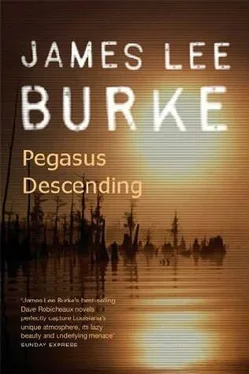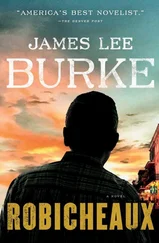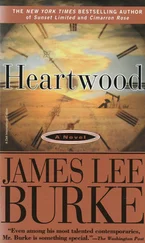I sat down in one of the scrolled-iron chairs on the deck and stared at my shoes a moment. “I think Tony Lujan was involved in the death of a homeless man. I think his mother told you what her son had done. You didn’t come forward with that information, Mr. Alridge. That’s called aiding and abetting after the fact.”
“Maybe what you say is true. Maybe it’s not. But as an ordained minister I have certain protections under the law.”
“We can settle some things here or we can do it in front of a grand jury. The word is Bello Lujan and Whitey Bruxal and a few other casino operators launder money through a Washington lobbyist, who in turn gives it to your ministry. Then you exercise your influence on your religious constituency to shut down their competitors. Frankly, I don’t have any interest in your ties to the gambling industry. But I’ve got three open homicide cases on my hands, and I believe you’ve got the key to at least one of them.”
The evening light had receded into a single strip of purple and red clouds on the western horizon, but even in the gloom I could see my words take hold in Alridge’s face, as though he had been bitch-slapped in public.
“You need to speak to my attorney,” he said.
“Fuck your attorney. If you want to shill for Whitey Bruxal and Bello Lujan, that’s your business. But Tony Lujan and maybe Slim Bruxal, that’s Whitey’s kid, ran over a derelict and left him to die on the side of a road. We call the derelict Crustacean Man because we have no other name to put on him. But I guarantee you, Mr. Alridge, before this is over, that guy is going to have a name and somebody is going to take the bounce for his death. If you’re aiding and abetting, your next evangelical crusade is going to be on closed-circuit TV in Angola Pen.”
He rose from his chair, flipping open his cell phone, almost spiking himself in the eye on one of the umbrella’s points. “I just hit the speed dial to the ministry’s security service. They’ll help you find your way to your vehicle.”
I stood up and looked at the sunset. The air was filled with the heavy, damp, green smell of the Gulf, and I said or perhaps thought a prayer of thanks for the fact I didn’t have to live inside Colin Alridge’s skin. “One cautionary word before I go,” I said. “I used to find ways to skirt on the edge of blowing out my own doors. That’s how depression works. It’s like being drunk, except you don’t know you’re drunk, and you find ways to set yourself up for the Big Exit because you can’t deal with the guilt that’s stitched like a black tumor across your brain. I’d give some thought to my problems, Mr. Alridge, before I stepped across a line and found myself irrevocably on the way to being dead for a very long time.”
Then I walked back down the steps and followed a sandy path toward my truck, the wind cool and gusting off the bay through the pines. When I looked over my shoulder, Alridge was still on his deck, his hands propped on the railing, like a ship’s captain peering out onto the ocean, every light in his house blazing against the darkness.
THAT NIGHT I SLEPT in a motel in Slidell, on the northeast side of Lake Pontchartrain, and early the next morning I returned to New Iberia. I felt better for having confronted Alridge, but I was no closer to resolving the contradictions at work in the Lujan homicide. With rare exception, homicides are committed for reasons of money, sex, or power, or any combination thereof. What was the motivation in Tony’s death? If Monarch Little was the shooter, it was because he had tried to extort money from Tony and the extortion attempt had gone south. But Tony’s occasional girlfriend, Lydia Thibodaux, had indicated Slim Bruxal had gone to the meeting with Tony. Where was Slim while Tony was being blown apart, or was Slim in fact the shooter?
It was possible. Slim was probably mixed up in the death of Crustacean Man and feared that Tony would flip for the D.A. By killing Tony and putting it on Monarch, he would take out two problems at once. But in my mind’s eye I could still see the point-blank wounds delivered to Tony’s skullcap, jaw, and viscera. The person who killed Tony had borne him a special hatred and was not simply a cynical pragmatist getting a problem out of the way.
Who kills with that kind of insatiable rage?
Someone whose anger and desire for revenge comes straight out of the libido.
I looked at the clock. It was 1:21 p.m. on Friday. What better time to catch an academic about to flee a faculty meeting for the solace of a dry martini in his backyard? I called the political science department at UL in Lafayette and was told that Dr. Frank Edwards had already gone for the day.
“Could I have his home telephone number?” I asked.
“We’re not allowed to give that out,” the secretary said.
“I’m a police officer.”
“So why don’t you look in the phone directory?” she said.
I flipped open the Lafayette phone book and found the number at the top of the page. The address was in an oak-shaded neighborhood in an old part of town, one of those urban enclaves where people hold on to their accents and their eccentricities and take a peculiar pride in the genteel poverty that often marks their lives. The phone rang for a long time before a man picked up. I assumed he was not one who made use of answering machines. “Yes?” he said.
“May I speak to Dr. Edwards?”
“I’m Dr. Edwards.”
“This is Detective Dave Robicheaux of the Iberia Parish Sheriff’s Department. I’d like to talk with you about Tony Lujan and Slim Bruxal,” I said.
For a moment I thought the line had gone dead. “Are you there, Professor?”
“Lydia Thibodaux contacted you?”
“She said you encouraged her to come forward with information about Slim and Tony. I appreciate your having done that.”
Again the line went silent.
“I’d like to come over to Lafayette and talk with you in person,” I said.
“Yes, I guess you would,” he said, with a sense of resignation I didn’t understand. “I’ll be at home. How important will this turn out to be?”
“Excuse me?”
“Are we talking about a trial, public testimony, that sort of thing?”
“I’m not sure. Is there a problem, sir?”
“That depends on whether or not you think young brownshirts belong in our universities.”
I took the four-lane into Lafayette, and in forty-five minutes was through the university district and driving down a quiet residential street where the sidewalks had been broken and pitched by the huge tree roots that grew under them. Inside the filtered light and the ambience of shade-blooming flowers, the palms and Spanish daggers that grew under a canopy of live oaks, the air vines and lichen-stained goldfish ponds and the late-Victorian frame houses whose rain gutters bled rust down the walls, you could have sworn you were looking at a misplaced piece of history ripped out of the year 1910.
The political science professor was reading on the gallery of his two-story house, one knee crossed, a wood-bladed fan turning overhead, a shot glass and a small pitcher by his foot. A plump, middle-aged white man in mismatched gardening clothes was watering the caladiums at the base of an oak tree with a sprinkling can. When he heard the piked gate squeak open, he smiled politely in my direction, then walked casually into the backyard with his sprinkling can, his soft buttocks tight against his pants.
“You’re Dr. Edwards?” I said to the man on the gallery.
He glanced at my badge, which was clipped on my belt. “Would you like a glass of anisette? It’s ice-cold,” he said.
“No, thanks.” I walked up on the gallery, the boards under my feet sinking with my weight. I sat on the edge of a wide, deep-set straw chair. “Could you explain that remark about young brownshirts?”
Читать дальше












